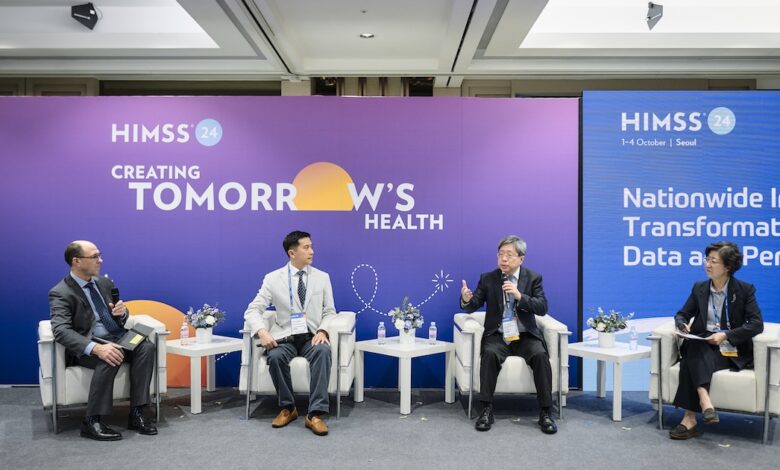Operationalising big data research for precision medicine: Lessons from Asia

Privacy, systems interoperability, and lack of research capability are some of the biggest challenges in utilising big data for national precision medicine projects in advanced health systems in Asia.
Health leaders from Taiwan, South Korea, and Singapore exchanged insights into harnessing big data for personalised medicine in the panel session, “Nationwide Initiatives in Healthcare Transformation – The Power of Big Data and Personalised Medicine,” at HIMSS24 APAC.
The panel involved Kee Yuan Ngiam, professor and head of the National University Health System’s AI office in Singapore, Dr Eric Chuang, VP and general director of Biomedical Technology and Device Research Laboratories at the Industrial Technology Research Institute in Taiwan, and Dr Hyun-Young Park, director of South Korea’s National Institute of Health.
Speakers shared that their respective countries are pursuing the same strategy to employ big data (which, for Dr Ngiam, may now be aptly called “huge data”): first, to integrate data across healthcare settings, and second, to build the necessary infrastructure to develop analytic and other innovative tools to support the healthcare system. All countries are currently working on their respective data integration projects.
In Singapore, that is through the recently launched common cloud-based platform HEALIX.
The Ministries of Health and Welfare and Economic Affairs and the National Science and Technology Council in Taiwan are working on respective projects to contribute to the Health Data Taiwan initiative, which aims to provide one integrated source of health data.
Meanwhile, the South Korean government is pursuing its ambitious National Bio Big Data Project, aiming to collect clinical, demographic, and genetic information with consent from one billion individuals.
Addressing privacy, interoperability woes
Given their strict data regulatory regimes, researchers in South Korea and Taiwan have found it difficult to access big health data.
This issue is further magnified by difficulties in securing patient consent. “Many researchers are interested in using hospital genomic data, but medical institutions and civic groups often resist the use of such sensitive information without individual consent,” Dr Park shared.
She added that providing consent to sharing sensitive information is something cultural. “In Korea, a person dealing with a genetic disease may not want to share that information even with their family.”
Through its latest national project, the South Korean government ensures it still adheres to strict privacy regulations while only collecting clinical, genomic, and lifestyle data with consent at the start of the collection process.
In the case of Taiwan, hospitals having different IT systems is a major problem. “Even though Taiwan has a national health insurance program like in Korea, each individual hospital or medical centre is running their own IT system… [which makes it] very challenging and difficult to exchange data,” Dr Chuang noted.
The Taiwanese government now is helping resolve such interoperability issues by promoting common data exchange standards – preferring HL7 FHIR.
Building capacity
Luckily for Singapore, they do not deal with these institutional challenges, according to Dr Ngiam. “Most hospitals are now running on the same EHR system. In the next two years, the whole country will be on a single EHR system.”
“I think that the real challenge we have is not so much [the concerns on data] privacy,” Dr Ngiam exclaimed. “[It has more to do with] the means and the [computing ability] to use that data effectively.”
Many governments and research organisations, he claimed, are not seeing much returns on their investments in genomic studies as they fail to operationalise insights generated from their research.
“I hope that we are able to use genomic data in more meaningful ways going forward.”
Meanwhile, Singapore is also training large language models so it no longer has to move volumes of genomics data along with other healthcare data. “It’s not simple to move that data. You [may] need a truck to move that data,” he said, noting that there may be around 30-40 petabytes of genomics data collectedacross the country.
“The answer to this problem is to create abstractions of genomic data that can be used practically by clinicians and researchers… by training models.”
Future direction
Taiwan in recent years has focused its investments on precision medicine by covering the cost of genomic testing of its citizens through its national insurance system. Its new government administration this year has pledged as much as NT$10 billion ($300 million) in funding for new cancer drug and therapy development.
For South Korea, Dr Park hopes to see genetic data utilised in the future in such areas as newborn screening, chronic disease prediction, drug selection, pharmacogenetics, and personalised health management.
The recent development of large multimodal models (LMM), which includes other data formats such as images, is also expected to be applied in healthcare to support big data research in the future. “In healthcare, data is very proprietary and very specific, so not every country or organisation has the resources to train a model that includes, say, genomics data. I’m really looking forward to the time when we [can use] LMMs,” Dr Ngiam said.



